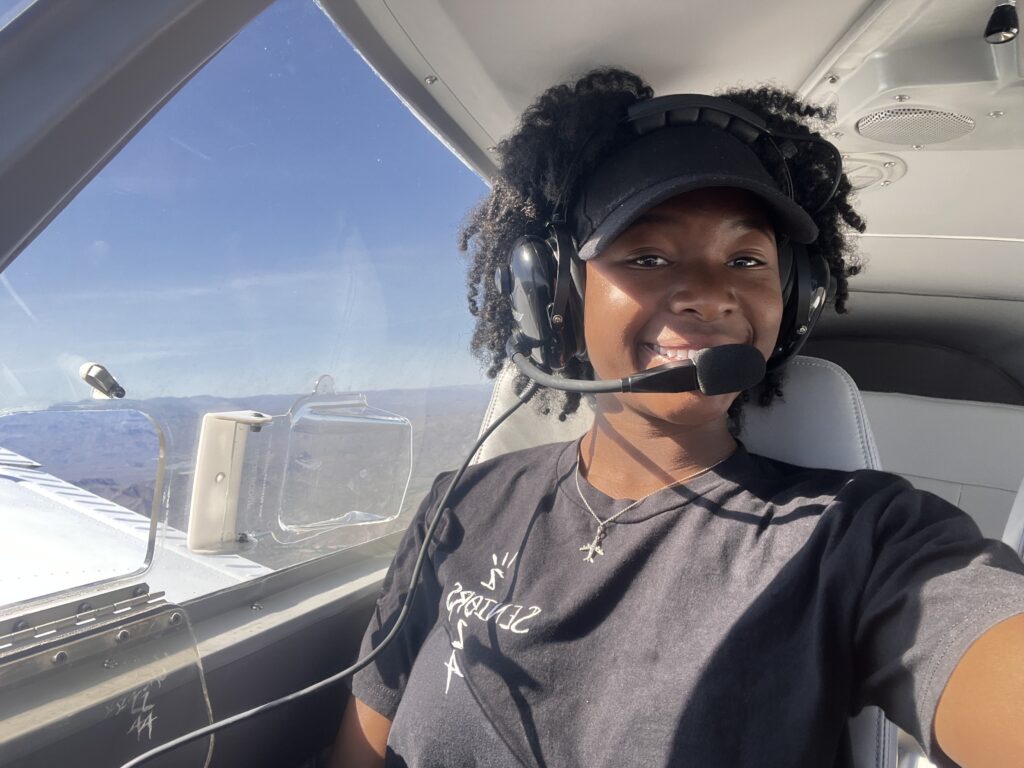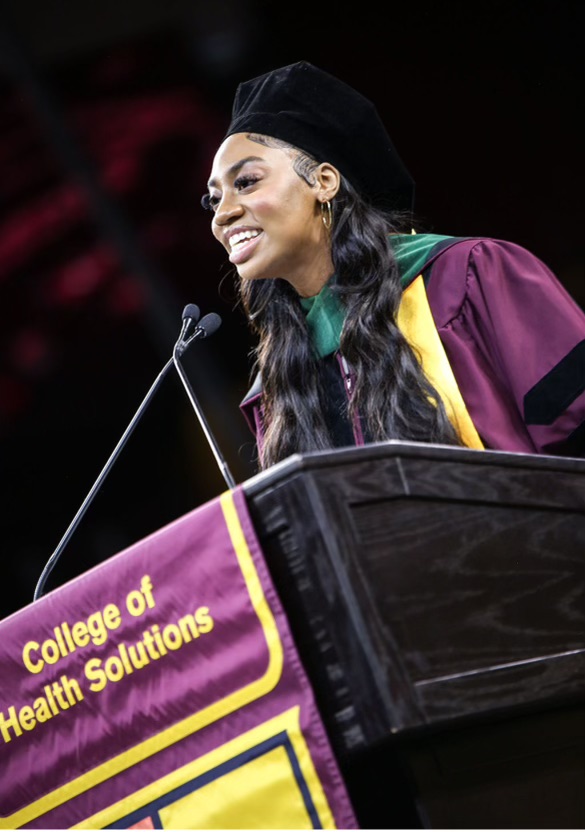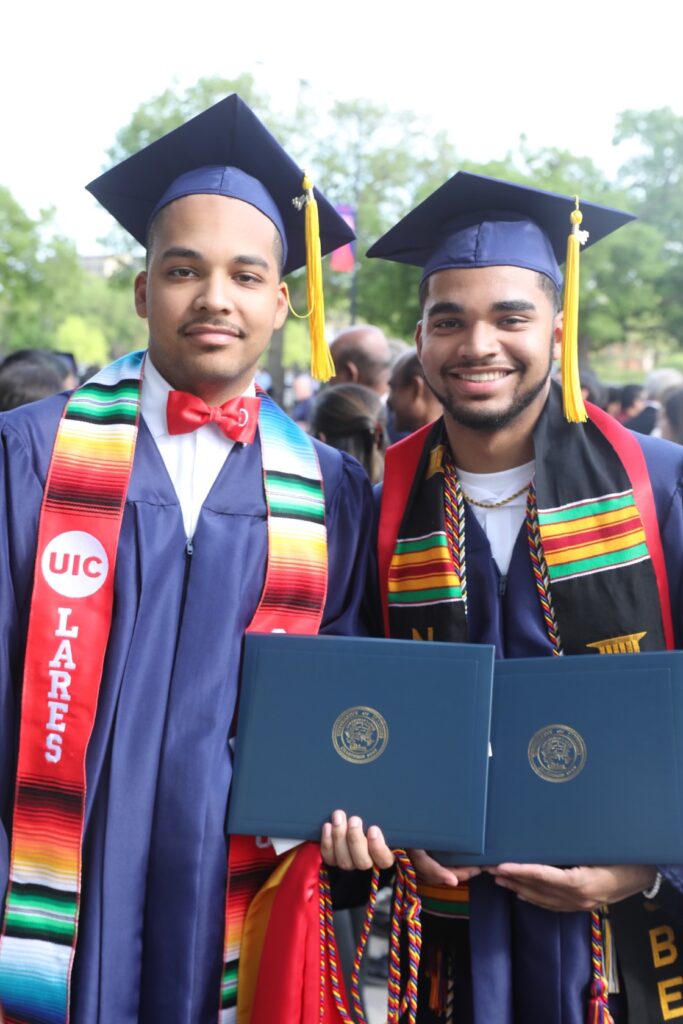“Young people: Regardless of your station in life today, know that you were born to lead tomorrow.”—The Honorable Minister Louis Farrakhan, Saviours’ Day 2008, “The Gods at War: The Future is All About Y.O.U.t.h.”
The Honorable Minister Louis Farrakhan refers to the current generation of Black youth as the “Joshua Generation.” Today’s talented and gifted young, Black men and women are known for their courage, fearlessness in confronting injustice, and ability to tackle new feats.
But another avenue they have proved to be fearless in is education. Many are getting their degrees at young ages. Others are doing what was said to be impossible, like when Calcea Johnson and Ne’Kiya Jackson out of New Orleans came up with a new, trigonometric proof for the Pythagorean theorem as high school students.
And 15-year-old Khaya Njumbe turned heads when on May 8, he graduated from Indiana University (IU) Northwest, making him one of that state’s youngest-ever bachelor’s degree recipients.
The Final Call spoke to several Black youths making waves about their goals and what motivates and inspires them in their educational journeys.
Soaring to new heights
Yanees Muhammad, 18, graduated from South Mountain High School in Phoenix, Arizona, on May 21. During her time at the school, she served as cheerleader captain, ran track for three years, served as the company commander of her school’s Junior Reserve Officers’ Training Corps (JROTC) and served as president of the Black Student Union.
On top of all her responsibilities, she obtained her private pilot license after passing the Federal Aviation Administration’s Private Pilot written examination at age 17.
When Yanees Muhammad first started attending South Mountain in her junior year, she was severely behind. Her grades began to slip after the passing of her grandmother, Celestina Muhammad, and her uncle, Ameer Muhammad. When her family first moved to Phoenix, her report card read “F,” and she had no high school credits.
“When she was told that she may not graduate on time, I saw the look on her face. I believe something clicked then. After that, her determination was next level. She became laser-focused,” her mother, Anicia Muhammad, said to The Final Call.
“I’m so proud of her. I can’t even put into words the feeling she gives me to know she is living her dream and making a difference in the world by inspiring young people.”
The flight program Yanees Muhammad enrolled in started during sophomore year. The young high schooler beat the odds by enrolling anyway and taking two flight classes simultaneously to catch up to her peers.
“I had to do endless amounts of studying to pass the Federal Aviation Administration’s (FAA) written exam, which takes two hours. On top of that, I’m still a high school student taking regular courses,” she said.
Her mother kept her motivated, along with the memory of her grandparents, Salim Muhammad, who was the Fruit of Islam (F.O.I.) Captain for Mosque No. 32 in Phoenix and an aide to the Honorable Minister Louis Farrakhan, and Celestina Muhammad.
After long days of leaving for flight school at 5:00 a.m. and attending high school at 9:00 a.m., Yanees Muhammad is graduating at the top of her class.
She plans to attend Texas Southern University to obtain her bachelor’s degree in aviation science technology management with the career goal of being an emergency medical services helicopter pilot and then a commercial pilot. She would be among the less than one percent of Black women who are pilots. She is also working on an inspirational children’s book.
Degrees on degrees
Chicago teen Dr. Dorothy Jean Tillman II entered her freshman year of college at 10 years old. She just recently walked in her graduation ceremony with her doctoral degree in integrated behavioral health from Arizona State University’s College of Health Solutions. She is 17 years old.
“It was surreal. I was excited because all my friends and family were there. I saw classmates that I only normally see on Zoom for the very first time in person and met and got a chance to hug the chairman of my dissertation committee,” she said. “I never really looked at it as a time factor of seven years,” she said.
“This one seems more exciting because it’s coming off the pandemic, and I didn’t get a chance to march in my graduation at the master’s level,” she added. “Not only did I march, but I was able to speak in front of 20,000 people, and delivering that speech was truly an honor.” She credited her Christian faith and her village.
“Once I start something, I like to complete it. I’m a planner by nature, so it was in my plan to do certain things. I continue to do them until it’s done,” she said.
Dr. Tillman is the founder and chief executive of the Dorothyjeanius STEAM Leadership Institute. She plans to fundraise for the institute and learn how to franchise.
Her academic journey started at Muhammad’s Mathematics, Science & Engineering Academy under the leadership of Shahidah Muhammad, Lisa Muhammad and Marlo Tsai. She also attended Muhammad University of Islam (M.U.I.) in Chicago.
The Honorable Elijah Muhammad taught that our children can get their PhD at 18 and when Dr. Tillman and her mother became aware of what the Messenger stated, they were inspired to pursue that goal.
Two brothers tackle engineering
Brothers Sultan Sadeeq Muhammad and Rashaun Ali Muhammad walked across the stage this graduation season. Sadeeq Muhammad, 21, majored in mechanical engineering and minored in communications at the University of Illinois Chicago. His younger brother, Ali Muhammad, 20, majored in industrial engineering with a business administration minor.
Both were exposed to STEM (science, technology, engineering, mathematics) programs and activities at young ages at Muhammad University of Islam in Chicago. They attended the school from pre-K through high school graduation.
“I always knew I wanted to do something STEM-related, engineering-related. I chose mechanical because I felt as though it was the most diverse one,” Sadeeq Muhammad said. “I had the opportunity to take electrical engineering classes, some industrial engineering classes, some civil,” he continued.
“I always leaned more towards business, the business side of engineering, so the logistical, how things get done, how products are actually made,” Ali Muhammad said.
The brothers explained the difference between mechanical engineering and industrial engineering, a debate they have had with each other far too many times.
Though they were in the same department—the mechanical and industrial engineering department—mechanical engineering relates to the design of machines while industrial engineering sets up a concept and a theoretical framework to move product ideas into reality and into the hands of the customer.
Ali Muhammad entered college at 15 years old. “Being around people in their 20s and sometimes in their 30s and 40s was very intimidating. I had to mature very, very quickly. And not only mature, but really know how to interact with people not only older than me, but also just a tad bit more smarter than me.
I had to increase my vocabulary a lot,” he said. He described the college experience at a young age as a daunting task. “But we stayed focused and stuck it through,” he said.
Sadeeq Muhammad described the experience as years of development, learning and self-discovery.
While in college, the brothers both maintained academic qualification for full-ride scholarships, and both were recognized for their outstanding leadership roles with the National Society of Black Engineers. They were also founding members of a new student organization, the Black Muslim Student Collective.
“We got registered as the official student organization literally this last semester. It’s the first ever at UIC,” Sadeeq Muhammad said. “We were blessed to say we contributed to the success, environment and just overall support of Black Muslims on campus.”
The brothers have completed several job applications and have had several interviews to work in their profession. Sadeeq Muhammad is also open to getting his master’s in engineering education and desires to possibly be a teaching assistant, professor or a scholar in mechanical engineering. He wants to teach engineering and give back to his community.
Later in life, Ali Muhammad desires to open an engineering firm. “I’m centered around Black people on the South Side of Chicago, which is really similar to Sadeeq—to educate or expose more people, more Black people, to engineering and STEM through displaying my work or my business later on in life,” he said.
Their parents, Imam Sultan Rahman Muhammad, Student National Imam of the Nation of Islam, and Naadhera Muhammad, both who are educators, expressed how proud and grateful they feel.
“They were blessed to graduate at very early ages. Rashaun Ali at 15, Sultan Sadeeq at 16, and in the spirit of educating our children at a young age, they followed in the footsteps of our family and our Nation as great-great-grandchildren of the Honorable Elijah Muhammad and Mother Clara Muhammad,” Imam Sultan Muhammad said.
“As their grandfather, Brother Sultan Muhammad, who was the youngest Black flight captain in America at the age of 15 years-old, I see our sons, praise be to Allah (God), following in that vein of excellence.”
He described his sons’ ability to stand out as leaders on their campus, grabbing the attention of both faculty members and peers.
Naadhera Muhammad emphasized the benefits and cultivation her children received at MUI.
“From Ali starting school, pre-K, at two, and he graduated early. And he was determined to graduate early in 11th grade to attend college with his brother,” she said.
“Taking double the load at 14 and graduating at 15, it just proves what our children can accomplish when they have the proper nurturing and support system that our school provides; down to not just the community—the teachers, the diet, their character, the Islamic studies—just all-around teaching and nurturing,” she added.
Imam Sultan Muhammad thanked the Honorable Minister Louis Farrakhan for his work in re-establishing the Nation of Islam and Muhammad University of Islam after the departure of the Honorable Elijah Muhammad.
Educating Black youth
Imam Sultan Muhammad emphasized the importance of keeping before Black children the reality that they can accomplish whatever it is they desire.
“One of the biggest things is, as an educator, and it may sound unorthodox, but not to stick to a lesson plan or syllabus. We may have different learning targets in the classroom for our students. However, oftentimes our students are able to acquire much more knowledge than we may expect, if given the proper environment,” he said.
He pointed to former M.U.I. student Dr. Tillman as an example. “I would notice sometimes she was not interested in the particular lesson that we may have had in class, so I would allow her space. ‘Well, Dorothy, I see you don’t seem to be too interested today in this.
What is it that you would want to do?’ And I would open up the book and show her where we were headed and give her an opportunity to actually even apply new concepts through arts and crafts,” Imam Sultan Muhammad said.
“I would give her assignments that would allow her to creatively begin to approach new concepts in her Arabic study.”
He shared how if students like Dr. Tillman are not given the space for achievement, they are often labeled as disruptive and having difficulty with grasping a lesson. “Well, it’s a lesson you’re forcing them to try to keep with once they already have a basic understanding of it, so it’s about approach,” he explained.
As a parent, Imam Sultan Muhammad also shared that it’s important to make sure there’s a strong parent-teacher relationship.
“When the parents and the teachers can come together with that focus of a shared desire for success of the student, there is nothing that would hold our children back,” he said.
Support and advice
Support systems have proven integral for Black youth to succeed.
Sadeeq and Ali Muhammad both expressed gratitude for having graduated and emphasized the support system they had. “Our support system showed up and showed out. So, our parents, family, M.U.I., our mosque, community, they were with us the whole step of the way,” Sadeeq Muhammad said.
“I went into college at 15, so I literally had to have my parents sign lab waivers because I was a minor,” Ali Muhammad said. “I had a support system, thanks to Allah, and the people in the mosque and family.”
He noted that the mosque and his family were always there.
“Sometimes I would find myself on campus or even just in the routine of doing work. Sometimes you may forget why you’re doing something, and our community, our family, always checked our ‘why’ at the forefront. I can say I never got lost in any activity or even just challenge or conflict within studying,” he said.
“As far as Black youth and youth in general, that’s very much needed, because we may get lost in this world for whatever reason, whether it be personal or even just an attraction to what we think to be opposite, To have a reminder as to why you’re doing something, who you’re doing it for at all times was very much needed, and it works,” he added.
Yanees Muhammad and her mother set up a GoFundMe to help cover her college financial needs. She needs an extra $5,000 every semester to cover the needs for her aircraft and fuel.
She advised other Black youth to remember why they started and “know that you belong.”
“Even if you’re the only male, female or Black person in the room, you belong. Walk with confidence, and don’t forget who you are. Go out in the world and make yourself proud,” she said.
Dr. Tillman urged young people to listen to those around them but to do what is best for them.
“Don’t feel as though if you pivot, you failed. Don’t feel as though if you have not reached levels that people think you should be reaching, that you failed. Take time and explore opportunities and get to know what you like and how you can utilize what you like to be something that you do for a living,” she said.
“To the parents of gifted children or children that show and demonstrate gifts, don’t share my story and say, ‘Hey, look at her. Let’s be like her.’ Find out what it is the child likes to do,” she added. “Do not try to force a square peg into a circle hole. Allow them to explore their gifts.”
The Honorable Minister Louis Farrakhan has continuously provided words of encouragement to Black youth. “Black Youth: Know that the future is safe if you become who you are,” the Minister tweeted on April 24, 2017.
In another tweet, on Dec. 23, 2016, he questioned, “Black Youth: If you are a direct descendant of the Originator of the heavens and the earth, is there anything that you cannot accomplish?”
Stay tuned for additional coverage on the accomplishments of some amazing and talented Black youth in an upcoming edition of The Final Call.
















